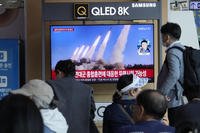
For most of the Cold War and beyond Russia has been the prime arms supplier to India, especially with respect to naval ships, aircraft, and weapon systems. That relationship now appears to be cooling down with India even buying maritime patrol aircraft -- the new Boeing P-8 Poseidon -- from the United States. (They will replace Tupolev Tu-20 Bear aircraft.)
The two major ship acquisition projects of the Indian Navy have now been substantially delayed: The first is the "indefinite" delay in the delivery of the first Project 971M nuclear-propelled attack submarine (SSN) -- known in the West as the Akula II. A Russian newspaper has reported, "The pre-delivery trials have been postponed by the Amur Shipyard as it has no trial crew and is running short of cash."
This follows the 8 November 2008, accident in which 20 members of the shipyards trials crew were killed during an accident while underway in the Sea of Japan. Other crewmen were injured when fire-fighting chemicals were accidentally released into the craft. Some accounts say that other crewmen have refused to sail in the submarine. Apparently a new trials crew will not be ready before March of this year and will have to undergo a lengthy training process before it is ready for submarine trials and to train the Indian crew.
The Indian Navy was to have received the first of two SSNs on lease from Russia last year, but prior to the accident the schedule for the lead submarine was changed to an August 2009 delivery. That schedule has now been set back perhaps a year or more.
These SSNs are being acquired to train the Indian crews for the indigenous nuclear submarines being constructed under Advanced Technology Vessel (ATV) project. This project, undertaken with Russian technical assistance, will make India the sixth nation to have constructed nuclear submarines after the United States, Soviet Union, Britain, France, and China. However, India earlier leased a Project 670known in the West as Charlie -- nuclear-propelled cruise missile submarine (sans missiles), from January 1988 to January 1991.
The reactor plant for the ATV project is being developed at the Indira Gandhi Centre for Atomic Research at Kalpakkam. The development of a submarine reactor plant began in the 1970s. According to some sources, the shipyard at Vishakapatnam will launch the ATV submarine later this year, but the Akula II accident will undoubtedly delay completion beyond the previously estimated 2010 to 2012. There are reports that India is planning to produce five such SSNs, which could be armed with nuclear land-attack cruise missiles.
The delay in the Indian submarine is accompanied by further delays in the Indian acquisition of the Soviet-built aircraft carrier Admiral Gorshkov. Delivery of the carrier, now being modified and modernized at the Russian shipyard Sevmash at the northern city of Severodvinsk, will be delayed several years.
The original US $1.5-billion contract signed in 2004 called for delivery of the carrier -- renamed Vikramaditya -- about 2008. The Russians have advised the Indian government that the carriers delivery will be delayed four or five years beyond that date, with Russian officials claiming that they underestimated the amount of work required. They are demanding another US $1.2 billion to finish the ship -- almost the same amount as the original contract cost.
In addition to rebuilding the 45,000-ton ship, originally completed in December 1987, the Russian government is to provide MiG-29K Fulcrum fighter-attack aircraft and Ka-27 Helix-A and Ka-31 Helix-B helicopters as part of the agreement.
In Indian service the Vikramaditya will replace the ex-British carrier Hermes, a VSTOL carrier that had a key role in the 1982 conflict in the Falklands, and is some 50 years old. While India is building a carrier in its own shipyards, having already paid Russia $500 million of the original contract price, and needing the Gorshkov before its indigenous ship could be delivered, the Indians are stuck with the Russian deal. . . which certainly marks a cooling in Russian-Indian relations.
-- Norman Polmar








